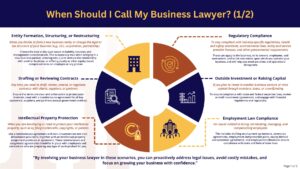On April 23, 2023, the Federal Trade Commission (FTC) announced a final rule banning noncompete agreements under sections 5 and 6(g) of the FTC Act. The ban applies to noncompetes in the employment context and does not necessarily apply to business-to-business noncompete agreements.
This banning of non-compete agreements has left many employers wondering what this means for their business. This blog post will break down the key aspects of this ban, its potential impact, and alternative strategies to protect your confidential information.
What is a noncompete agreement?
A noncompete agreement is an agreement that prevents a party from competing with the other party. In the context of employment, a noncompete agreement (or noncompete clause in a broader agreement) would prevent an employee from competing with the employer during and/or for a period following employment.
Noncompete agreements are not necessarily restricted to employment contracts – businesses may covenant not to compete in commercial agreements, which in some cases implicates antitrust laws. But the FTC’s final rule is intended to cover only noncompete agreements in the employment context, defining “non-compete clause” as:
(1) A term or condition of employment that prohibits a worker from, penalizes a worker for, or functions to prevent a worker from:
(i) seeking or accepting work in the United States with a different person where such work would begin after the conclusion of the employment that includes the term or condition; or
(ii) operating a business in the United States after the conclusion of the employment that includes the term or condition.
(2) For the purposes of this [rule], term or condition of employment includes, but is not limited to, a contractual term or workplace policy, whether written or oral.
One other term in the FTC’s final rule bears noting now – the term “senior executive,” which is any worker who:
(1) Was in a policy-making position; and
(2) Received from a person for the employment:
(i) Total annual compensation of at least $151,164 in the preceding year; or
(ii) Total compensation of at least $151,164 when annualized if the worker was employed during only part of the preceding year; or
(iii) Total compensation of at least $151,164 when annualized in the preceding year prior to the worker’s departure if the worker departed from employment prior to the preceding year and the worker is subject to a non-compete clause.
What does the final rule do to noncompete agreements?
“Noncompete clauses keep wages low, suppress new ideas, and rob the American economy of dynamism, including from the more than 8,500 new startups that would be created a year once noncompetes are banned,” said FTC Chair Lina M. Khan. “The FTC’s final rule to ban noncompetes will ensure Americans have the freedom to pursue a new job, start a new business, or bring a new idea to market.”
The FTC estimates that the final rule banning noncompetes will lead to new business formation growing by 2.7% per year, resulting in more than 8,500 additional new businesses created each year. The final rule is expected to result in higher earnings for workers, with estimated earnings increasing for the average worker by an additional $524 per year, and it is expected to lower health care costs by up to $194 billion over the next decade. In addition, the final rule is expected to help drive innovation, leading to an estimated average increase of 17,000 to 29,000 more patents each year for the next 10 years under the final rule.
More specifically, the final rule determines that for workers other than “senior executives” (a term the rule defines), it is an act of “unfair competition”: “(i) To enter into or attempt to enter into a non-compete clause; (ii) To enforce or attempt to enforce a non-compete clause; or (iii) To represent that the worker is subject to a non-compete clause.”
With respect to senior executives, it is an act of unfair competition”: “(i) To enter into or attempt to enter into a non-compete clause; (ii) To enforce or attempt to enforce a non-compete clause entered into after the effective date; or (iii) To represent that the senior executive is subject to a non-compete clause, where the non-compete clause was entered into after the effective date.”
In light of the above, on the “effective date,” any noncompete agreement with a general worker will be void, and noncompete agreements with senior executives will be void on a prospective basis. Critically, employers must give notice to workers, on or before the “effective date,” and in a “clear and conspicuous” manner, that the noncompete agreement will not be and cannot legally be enforced against them. The rule details specifically what the notice must contain and offers model language.
Are there carveouts?
There are some carveouts to the FTC’s ban on noncompete agreements. For example, the ban does not apply when a person enters into a noncompete agreement in connection with their sale of a business to a third party – which is consistent with states like California that already banned employee noncompetes. The FTC’s ban will also not extend to noncompete claims arising prior to the effective date of the rule, or where a person has a “good faith” belief that its attempt to enforce a noncompete does not violate the rule.
What is the “effective date”?
Above, we discussed several provisions of the FTC’s rule that are based on the rule’s “effective date.” The rule defines the effective date as a date that is 120 days after publication of the final rule. So, employers have some time to get into compliance and provide the required notice before the rule takes effect.
What can employers do instead of using noncompetes?
Employers may still protect themselves without noncompete agreements. For instance, they can still use nondisclosure agreements (NDAs) and trade secret laws to protect sensitive business information. Trade secret laws protect information that an employer uses reasonable efforts to keep secret and that derives value from being kept secret. One of the ways employers can take reasonable efforts is via use of NDAs. According to the FTC, “over 95% of workers with a noncompete already have an NDA.”
NDAs and trade secret law are often narrower than a noncompete, which prohibit employment with a competitor regardless of whether the ex-employee had protected information. However, in light of the FTC’s final rule, employers will be more limited in their ability to restrict their employees’ ability to work for competitors following their employment.
What is next for noncompetes?
Over the coming months, it’s a near certainty the FTC’s final rule will be challenged in court by multiple challengers. Indeed, one company already filed suit against the FTC in a Texas federal court on the same day the final rule was announced. If a challenge is successful, the rule could be enjoined. If the rule is not successfully challenged, it will represent a substantial change in employee rights in many states, and lead to a host of employment-related lawsuits.

























